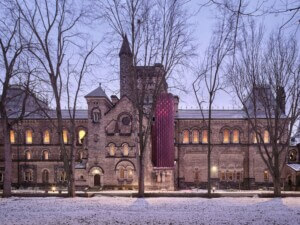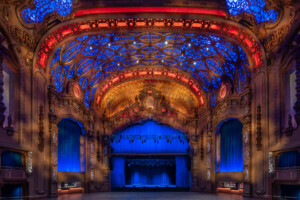Lucy the Elephant, a 65-foot-tall wood-and-metal pachyderm on the Jersey Shore, has served many purposes over the past 138 years: Real estate office, tavern, private beach cottage, and standalone tourist attraction. Lucy has also lived through a lot—hurricanes, flooding, lighting strikes, encroaching development, two relocations, general neglect, “moisture difficulties,” and even an inadvertent fire started by the patrons of said tavern.
Now, Lucy, greater Atlantic City’s most beloved jumbo-sized centenarian, is serving a new, though not all that surprising, role as a limited-time-only Airbnb rental. Because why hunker down for the night at Harrah’s or the Hard Rock Hotel Casino when there’s a giant, semi-habitable elephant that’s just steps from the beach and only costs $138 per night?
Lucy the Elephant’s stint as an Airbnb property, as mentioned, will be short-lived—three nights only. The Save Lucy Committee, the nonprofit preservation group serving as Lucy’s caretaker and guardian, is hosting one-night sleepovers on March 17, 18, and 19. Three couples will be able to book Lucy via Airbnb when the listing goes live on March 5.
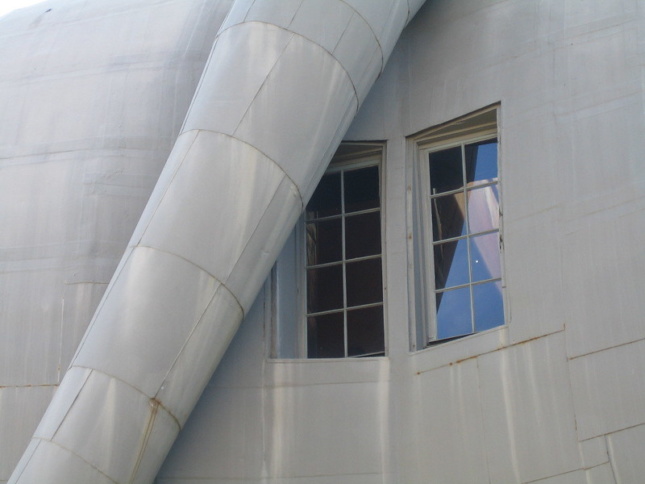
The modest proceeds from overnight stays in New Jersey’s most unique, ephemeral accommodations will go toward upcoming renovations.
“Right now, we’re faced with a major renovation project, starting this spring,” Richard Helfant, the executive director and CEO of the Save Lucy Committee, told CNN. “Lucy’s been painted so many times that her skin is at a point where it bubbles off. We’re at a time where we have to strip her down to the bare metal, prime and repaint. It’s a massive undertaking.”
Not quite a duck with a trunk, Lucy has been an enduring symbol of Margate, formerly South Atlantic City, since 1881 when she was erected by James V. Lafferty—real estate speculator, engineer, and proto animal-shaped building constructor—as a means of luring potential property buyers to the Jersey shore. While Victorian-era tourists gawked at the 90-ton behemoth from the outside, Lafferty escorted potential clients six-stories up the building’s internal staircase into Lucy’s howdah-cum-observation deck so that they could better survey the lay of the land. The building was originally named Elephant Bazaar but took on the Lucy moniker after Lafferty sold the structure to the Gertzen family in 1887. The Gertzens, who converted Lucy into a tavern and later a summer rental home for a British doctor and his family, maintained ownership of the building until 1970 when they donated it to the Save Lucy Committee.
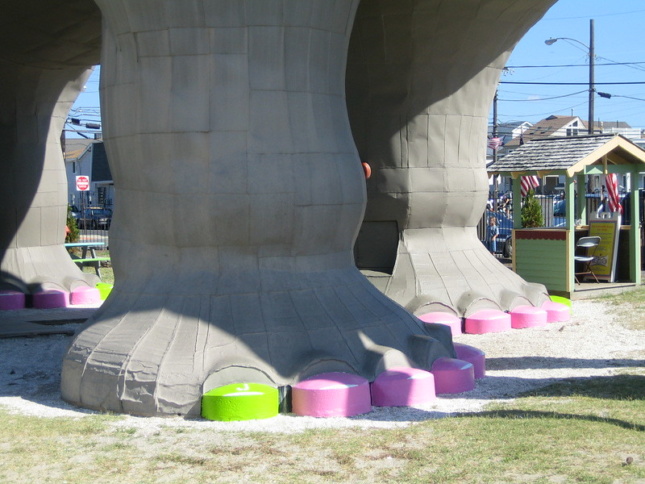
Designated as a National Historic Landmark in 1976, Lucy the Elephant is the only such listed property to be available for overnight stays on Airbnb per the attraction’s official website. It’s also apparently the first animal-shaped building to appear on the lodging platform ,as Liz Fusco, senior communications manager for the US East division of Airbnb, relayed to CNN. A certain beagle in Idaho, however, would quite literally beg to differ.
Airbnb aside, Lucy is an early, excellent example of programmatic architecture and is often been referred to as America’s first bona fide roadside attraction. While the early 20th century gave rise to a number of attention-grabbing buildings resembling things—the Brown Derby in Los Angeles (1926), Boston’s Hood Milk Bottle (1930), the Teapot Dome Service Station (1922) in Zillah, Washington, and, of course, the Big Duck (1931) of Long Island to name a few—Lucy arrived on the scene decades earlier, and has survived.
“The oldest surviving example of zoomorphic architecture on Earth,” Helfant recently told the New York Times in an article detailing Lucy’s upcoming run on Airbnb. Until 1900, there were three hulking elephant-shaped buildings on the East Coast including one on Coney Island which was also the creation of Lafferty.
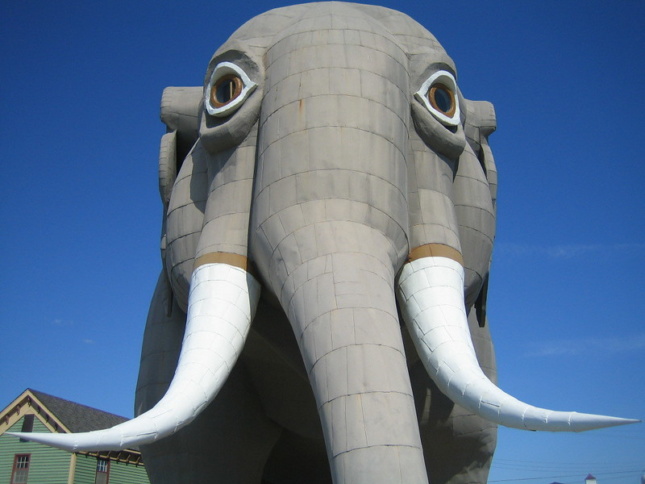
By the late 1960s, Lucy’s fate veered into bleak uncertainty.
While roadside novelty architecture maintained popularity, especially in car-crazy Southern California, the Jersey Shore’s elephant-shaped building had fallen prey to disinterest and disrepair. Harsh marine weather had ravaged the beachside building’s facade, its tourist-snaring capabilities began to wane, and, in 1969, the owners sold the land, and the elephant on it, to developers who intended to demolish the then-condemned building. This led to the formation of the Save Lucy Committee, which raised funds to relocate the building to city-owned land, now a park, and treat it to a massive renovation. She was also moved in 1906 after a major storm.
After four years of extensive restoration work, Lucy reopened to the public as a paid tourist attraction in 1974.
Under the auspices of the Save Lucy Committee, the building has remained open for tours ever since, attracting roughly 132,000 visitors annually according to the Times (currently, tours run 30-minutes long and cost $8.50 for adults). But this marks the first time since the early 1900s that anyone has paid to sleep in the belly of the elephant.
meet lucy. she’s…
🐘 a 138 year old wooden elephant
🏖 a jersey shore legend
🇺🇸 the oldest roadside attraction in america
✨ now available to book for a limited time, only on airbnbhttps://t.co/cx9wSLYhHU pic.twitter.com/rErCMQZeOR— Airbnb (@Airbnb) February 27, 2020
As the Times details, Airbnb has made, in the words of Helfant, a “sizable” donation to the Save Lucy Committee and decked out the surprisingly spacious interior of the building with period furnishings and decor—canopied bed, antique trunks, and grandma’s elephant tchotchkes galore—that nod directly to Lucy’s Victorian heritage. And although Lucy once boasted a working bathroom, it has since been removed. To compensate, a comfort trailer will be parked at Lucy’s painted toenail-ed feet during the Airbnb stays. A staff member and security guard will also be camped out overnight in the attraction’s adjacent gift shop. Breakfast will be served in the elephant.









